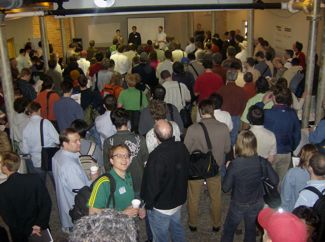The world of venture investing has changed….in case you haven’t noticed. Yes indeed, "small" is very much in — as in smaller investments — especially for startups having anything to do with the Internet. [And that would include most everything to do with IT and software today, not to speak of consumer services.] The reason is simply that startups don’t require as much capital in this age of…whatever you want to call it: "Web 2.0" or "the Internet as platform."
A great article in Saturday’s Wall Street Journal drove that point home again: VC’s New Math: Does Less = More? The main subject of the article was Peter Thiel, the former CEO of PayPal, who now runs a small VC firm that’s become the talk of the Valley. It invests "sometimes just a few hundred thousand dollars" in its deals, says the article, which also quotes him as saying that the venture-capital world "definitely needs to be shaken up." Thiel and his fellow founders and execs from his PayPal days have built quite a record of investing, including an early stake in Facebook. Last year, the NY Times also published an excellent article about Thiel and his "mafia": It Pays to Have Pals in Silicon Valley.

But Peter Thiel and his gang are hardly the only ones leveraging this new model. I present here six more that have it figured out pretty well, too, with most already reaping rewards, as firms they have backed have either been acquired or achieved big paper valuations. [There are surely other "new VCs" I could feature here, but these six are the ones I know best, from reading and commenting on their blogs, hearing them speak at conferences, or actually meeting some of them in person.] Note that most of these guys began by investing their own money as angels, which they gained from successful careers as tech entrepreneurs or traditional VCs, but all those that did start that way have morphed into the new breed VC, because they’re now investing other people’s money as well. That is, they’ve raised traditional VC funds, but tend to focus those funds on smaller, Internet/Web 2.0 type investments. (Thiel’s new career even goes beyond this, however, as he also manages a hedge fund, as noted in the Journal article.)
Breeding Winners
Who are the others pictured above? Josh Kopelman of First Round Capital is based in the most unlikely of places, suburban Philadelphia, but calls himself the "Redeye VC" (which is the name of his blog) because he’s flying to the Valley so often. His entrepreneurial background includes Half.com, which was acquired by Ebay. Josh was the subject of a feature just published by Fortune on people to keep an eye on in 2008, as the traditional media continues to discover these guys we know, because it’s realizing how much wealth they’re helping create behind the scenes. Josh’s portfolio will impress you.
Fred Wilson is the reigning godfather of Web 2.0 investors from his perch in NYC at Union Square Ventures. And that’s largely on the strength of his blogging — he blogs on his firm’s site, and at his personal blog, AVC. Check out his firm’s portfolio of Internet investments. Fred is hands-down the most prolific of the VC bloggers (with more readers than only Guy Kawasaki). I actually don’t know how he has time for much else with all the blogging and Twittering he does. (He’s an investor in Twitter.) But then, he’ll tell you he actually learns about many of his deals through his blogging. He considers it an unfair advantage, and has caused many other VCs to catch on to the benefits of writing in the blogosphere. For more on Fred, who’s actually a pretty private and low-profile guy (for example, he doesn’t show up at too many conferences), see this profile that appeared on a Wired blog earlier this year.
Jeff Clavier is one of only two of this group based in the Valley — Palo Alto in this case. [Note that two of the others are in SF, but three are elsewhere.] Jeff has an extremely interesting and eclectic background, starting in France, where he did an IT startup, acquired by Reuters, where he later served as a corporate VC. There, he managed early investments in such firms as Yahoo! and Verisign. He later migrated to the Valley and become one of the early investors in Web 2.0. His blog, Software Only, was an early and influential voice in this new world of venture capital. Just a few months ago, Jeff announced on his blog his new $12 million seed fund.
Brad Feld is based in Boulder, CO, and is one of five partners in The Foundry Group. He’s a prolific blogger, at both Feld Thoughts and Ask the VC. The latter is one of the best resources I know of for enterpreneurs seeking advice online. Brad is an amazing, high energy guy. A marathoner and an inveterate entrepreneur with a masters from MIT, he’s lived the entrepreneur’s life as founder of a
software firm that was acquired by AmeriData Technologies (later acquired by GE Capital), where he served as CTO. Brad was a driving force behind the launch this past summer of the TechStars competition in Boulder, and his firm has already funded some of the winners.
Dave Hornik is a very well known member of this new breed of VC, for two reasons — he was an early player, and he’s based in the Valley. His firm, from its cool digs on Sand Hill Road in Menlo Park, invests in more than just Internet services, however. Some of the names you would know in its Internet portfolio are Six Apart, Technorati, Evite (acquired), Shopping.com/Epinions (acquired), Postini (acquired), and Tumbleweed. Dave’s VentureBlog was one of the earliest VC blogs, which certainly contributed to his popularity, though he’s posting much less frequently there of late.
Aydin Senkut, by contrast, is probably the newest and least known of the group. An early Google manager, he left in 2005 and now runs Felicis Ventures in SF. You say you’ve never heard of it? Well, check out his portfolio. He was one of the subjects of a NY Times article a few days ago entitled A Post-Google Fraternity of Investors. While the ex-Googlers now investing in startups (most as angels, some as VCs) are not as tight-knit a group as the ex-PayPal founders and execs, there are potentially many more of them.
What do you think of this new breed of venture investor? Are they really changing the game, or are they simply more of the same-old Vulture Capitalists, just dressed in tee-shirts and jeans? 🙂 And, how early do you think entrepreneurs with new ideas should approach these guys? Will you?
UPDATE (1/7/08): For more on this trend in venture capital, no one says it better than Chris Shipley, Executive Producer of the DEMO Conferences. Check this out, from a series of recent DEMOblog posts on 2008 predictions: Venture Capital Feels a Pinch. [And, by the way, look for me at DEMO ’08 in Palm Desert, CA, January 28-30.]
 (Minnebar is held once a year, while evening "Minnedemo" sessions are held in each of the other three quarters.)
(Minnebar is held once a year, while evening "Minnedemo" sessions are held in each of the other three quarters.)
 But a dirty little question still needs to be asked. More on that later….
But a dirty little question still needs to be asked. More on that later…. 





Recent Comments